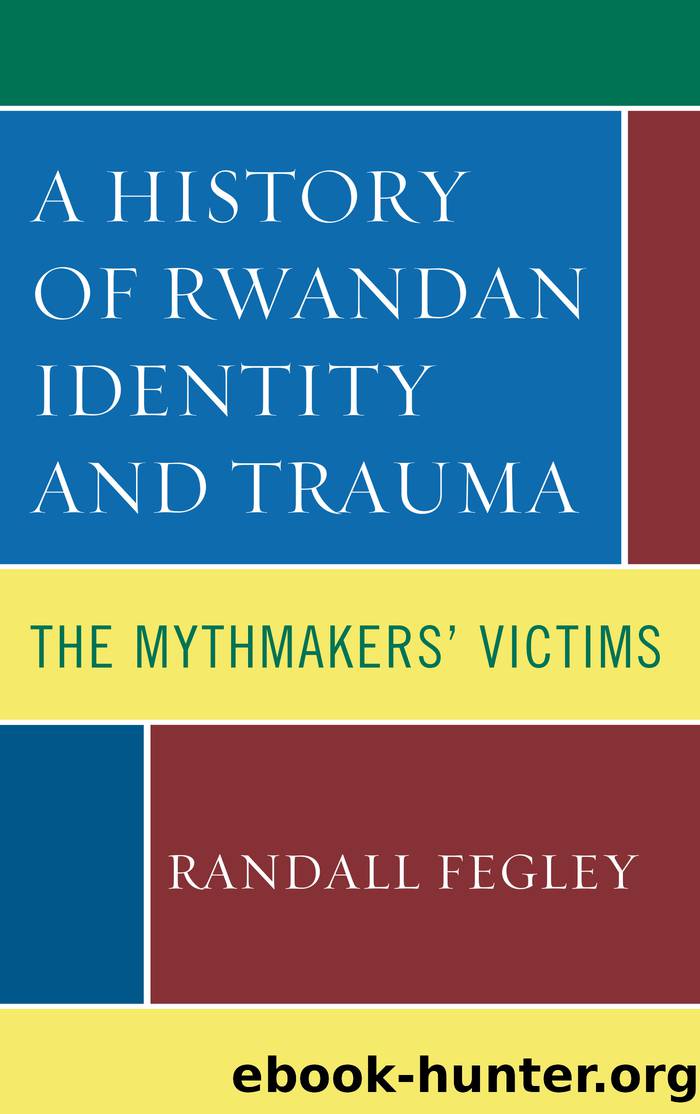A History of Rwandan Identity and Trauma by Fegley Randall;

Author:Fegley, Randall;
Language: eng
Format: epub
Tags: undefined
Publisher: Lexington Books
Published: 2012-08-15T00:00:00+00:00
Fueling fears on all sides is the continuing struggle to grapple with the inhumanity of the genocide and the need to build a new Rwandan identity. After the RPFâs victory in July 1994, the teaching of Rwandan history in schools was halted for a decade and a half, while educators, academics, and officials wrestled to develop a new narrative of the countryâs past. Meanwhile the attitudes of both the government and its opponents hardened. Increasingly the genocide is now portrayed as âa Tutsi genocide,â despite a December 1994 UN declaration that officially described the victims as both Tutsis and moderate Hutus.[66] When presidential candidate Victoire Ingabire asked for recognition of Hutu losses on official memorials in 2010, she and her American lawyer were detained for propagating ethnic hatred and were bitterly criticized in the local media.[67] She has since been sentenced to fifteen years in prison. That same year foreign observers in Rwanda noticed that the original inscriptions, on signs and in stone, at genocide memorials had been covered by banners declaring a purely Tutsi genocide.[68] At many of these sites, local docents had been replaced by activists touting an uncompromisingly official view. These observers also noted damage to sites that had previously been reconstructed. Clearly, people were not as willing to express themselves openly about the past or present. Any mention of Hutu and Tutsi identities and differences, apart from the term âTutsi Genocide,â was no longer allowed in public. Even the Twa have been obliged to rename themselves âpotters.â Long disconnected from the forests where they hid from past conflicts and killed by both sides in the civil war and genocide, they were believed to account for only about 0.4 percent of the population in 2010. Generations of sexual violence and consensual unions, but seldom marriage, with other groups have obscured their pygmy origins.[69]
Tutsi and Hutu identities are real, even if the often nervous government frowns on their very mention. A âthem-and-usâ mentality is deeply rooted. Everyone, especially older Rwandans, knows âwhatâ their co-workers and neighbors are.[70] Teaching history did not stop in 1994; it simply became the domain of parents and peers, whose narratives have often exacerbated differences. Others have opted to ignore the past. Developing the notion of âchosen amnesia,â deliberate loss of memory, Buckley-Zistel notes that many Rwandans seem to be âpretending peace.â[71] This denial of the unfathomable seems a natural human reaction. But in Rwanda, it appears on a national scale.
The direction of Rwandaâs language policies has also played a major role in building tensions. From 1994 until 2009, education was offered in either French or English. The governmentâs policy of dropping French and promoting English as the only language of instruction in secondary and higher education has been very controversial with French-speakers. Part of the rationale behind this change is the countryâs increasing ties with the East African Community and Commonwealth of Nations.[72] Undoubtedly, another factor is the RPFâs desire to distance itself from France, a country that actively supported the genocidal regime.
Download
This site does not store any files on its server. We only index and link to content provided by other sites. Please contact the content providers to delete copyright contents if any and email us, we'll remove relevant links or contents immediately.
The Vikings: Conquering England, France, and Ireland by Wernick Robert(83182)
Ali Pasha, Lion of Ioannina by Eugenia Russell & Eugenia Russell(40240)
The Conquerors (The Winning of America Series Book 3) by Eckert Allan W(37382)
The Vikings: Discoverers of a New World by Wernick Robert(36974)
Cecilia; Or, Memoirs of an Heiress — Volume 1 by Fanny Burney(32546)
Cecilia; Or, Memoirs of an Heiress — Volume 2 by Fanny Burney(31943)
Cecilia; Or, Memoirs of an Heiress — Volume 3 by Fanny Burney(31929)
Empire of the Sikhs by Patwant Singh(23072)
The Secret History by Donna Tartt(19052)
Hans Sturm: A Soldier's Odyssey on the Eastern Front by Gordon Williamson(18572)
Cat's cradle by Kurt Vonnegut(15334)
Pimp by Iceberg Slim(14487)
Sapiens: A Brief History of Humankind by Yuval Noah Harari(14367)
Talking to Strangers by Malcolm Gladwell(13346)
Norse Mythology by Gaiman Neil(13345)
Leonardo da Vinci by Walter Isaacson(13316)
4 3 2 1: A Novel by Paul Auster(12375)
Underground: A Human History of the Worlds Beneath Our Feet by Will Hunt(12085)
The Radium Girls by Kate Moore(12017)
